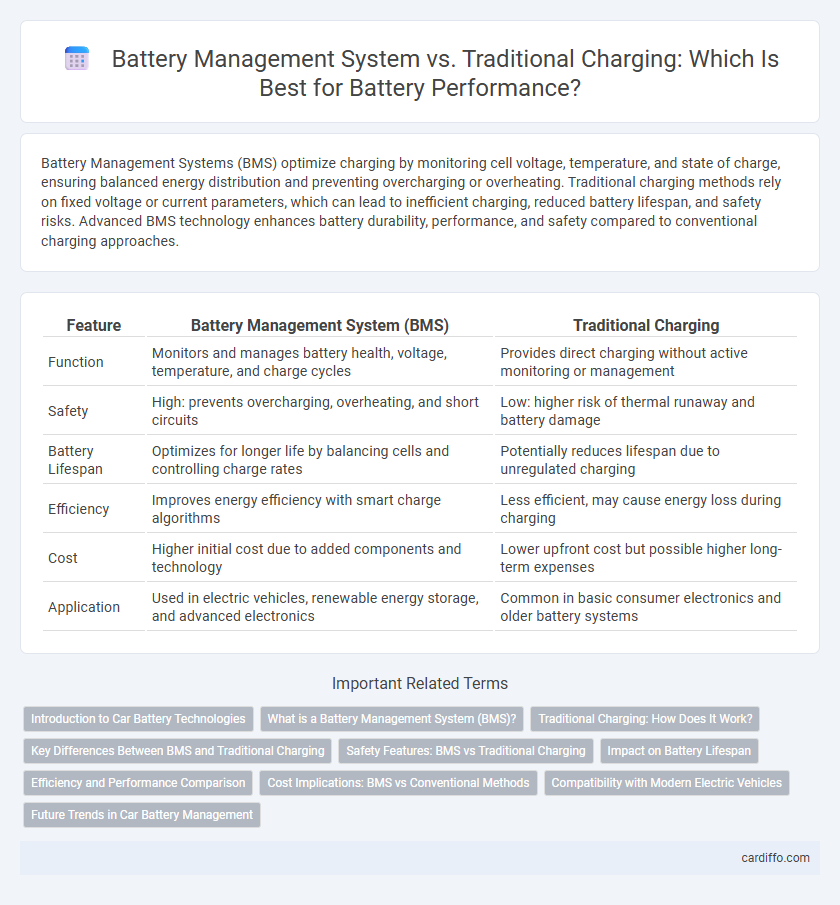Battery Management Systems (BMS) optimize charging by monitoring cell voltage, temperature, and state of charge, ensuring balanced energy distribution and preventing overcharging or overheating. Traditional charging methods rely on fixed voltage or current parameters, which can lead to inefficient charging, reduced battery lifespan, and safety risks. Advanced BMS technology enhances battery durability, performance, and safety compared to conventional charging approaches.
Table of Comparison
| Feature | Battery Management System (BMS) | Traditional Charging |
|---|---|---|
| Function | Monitors and manages battery health, voltage, temperature, and charge cycles | Provides direct charging without active monitoring or management |
| Safety | High: prevents overcharging, overheating, and short circuits | Low: higher risk of thermal runaway and battery damage |
| Battery Lifespan | Optimizes for longer life by balancing cells and controlling charge rates | Potentially reduces lifespan due to unregulated charging |
| Efficiency | Improves energy efficiency with smart charge algorithms | Less efficient, may cause energy loss during charging |
| Cost | Higher initial cost due to added components and technology | Lower upfront cost but possible higher long-term expenses |
| Application | Used in electric vehicles, renewable energy storage, and advanced electronics | Common in basic consumer electronics and older battery systems |
Introduction to Car Battery Technologies
Battery Management System (BMS) enhances the efficiency and safety of car battery technologies by monitoring voltage, temperature, and state of charge, ensuring balanced and optimized charging cycles. Traditional charging methods rely on fixed voltage and current settings, which can lead to overcharging or undercharging, reducing battery lifespan. Advanced BMS integration supports lithium-ion and solid-state batteries, improving performance and extending vehicle battery durability.
What is a Battery Management System (BMS)?
A Battery Management System (BMS) is an advanced electronic system that monitors and regulates the charging and discharging processes of rechargeable batteries to ensure optimal performance and safety. It continuously measures key parameters such as voltage, current, temperature, and state of charge to prevent overcharging, overheating, and deep discharge, which are common risks in traditional charging methods. By balancing individual cells and providing real-time data, the BMS extends battery life and enhances energy efficiency compared to conventional chargers.
Traditional Charging: How Does It Work?
Traditional charging relies on a constant current-constant voltage (CC-CV) approach, where the battery is charged at a steady current until it reaches a predetermined voltage limit, then switches to constant voltage until full capacity. This method lacks real-time monitoring and adaptive control, which can lead to overcharging, overheating, and reduced battery lifespan. Compared to Battery Management Systems (BMS), traditional charging offers simplicity but sacrifices efficiency and safety in battery performance.
Key Differences Between BMS and Traditional Charging
Battery Management System (BMS) offers precise monitoring and control of individual cell voltage, temperature, and state of charge, ensuring optimal battery health and safety. Traditional charging methods typically rely on fixed voltage or current limits without real-time data, which can lead to overcharging, overheating, and reduced battery lifespan. BMS integrates communication protocols and advanced algorithms for dynamic balancing and fault detection, unlike traditional charging that lacks these smart capabilities.
Safety Features: BMS vs Traditional Charging
Battery Management Systems (BMS) provide advanced safety features by continuously monitoring voltage, temperature, and current, preventing overcharging, overheating, and short circuits. Traditional charging methods lack real-time diagnostics and rely on fixed charge protocols, increasing risks of battery damage and potential hazards. The integration of BMS significantly enhances battery longevity and operational safety compared to conventional charging systems.
Impact on Battery Lifespan
Battery Management Systems (BMS) enhance battery lifespan by continuously monitoring voltage, temperature, and current, preventing overcharging and deep discharging that often degrade battery cells in traditional charging methods. Traditional charging lacks precise control, leading to increased heat generation and electrode damage, which significantly reduces battery cycle life. Implementing advanced BMS technology extends overall battery longevity by optimizing charging rates and maintaining safer operational conditions.
Efficiency and Performance Comparison
Battery Management Systems (BMS) optimize charging by monitoring cell voltage, temperature, and state of charge, leading to enhanced efficiency and prolonged battery life compared to traditional charging methods. Traditional charging often relies on fixed current and voltage settings, which can cause overcharging or undercharging, reducing overall battery performance. BMS technology enables dynamic adjustment that improves energy utilization, prevents thermal runaway, and maximizes battery cycle life for superior performance.
Cost Implications: BMS vs Conventional Methods
Battery Management Systems (BMS) reduce long-term costs by optimizing charging cycles, extending battery lifespan, and preventing damage through real-time monitoring. Traditional charging methods may have lower upfront costs but often lead to increased maintenance expenses and premature battery replacement. Investing in a BMS minimizes total cost of ownership by enhancing efficiency and reliability compared to conventional charging systems.
Compatibility with Modern Electric Vehicles
Battery Management Systems (BMS) offer enhanced compatibility with modern electric vehicles by optimizing charging cycles, monitoring cell health, and balancing voltage across battery cells, ensuring longevity and safety. Traditional charging methods often lack real-time data integration and adaptive control, leading to inefficient charging and potential battery degradation. Advanced BMS solutions align with the sophisticated energy demands and communication protocols of contemporary EV architectures, improving overall performance and reliability.
Future Trends in Car Battery Management
Future trends in car battery management emphasize intelligent Battery Management Systems (BMS) that enable real-time monitoring, predictive maintenance, and optimized charging cycles, significantly extending battery lifespan compared to traditional charging methods. Advanced BMS incorporate machine learning algorithms and integrated sensors to dynamically adjust charging rates, prevent overheating, and maximize energy efficiency. Innovations such as wireless charging integration and vehicle-to-grid (V2G) technology also represent the evolving landscape of battery management, ensuring sustainable and smart energy use in electric vehicles.
Battery Management System vs Traditional Charging Infographic

 cardiffo.com
cardiffo.com